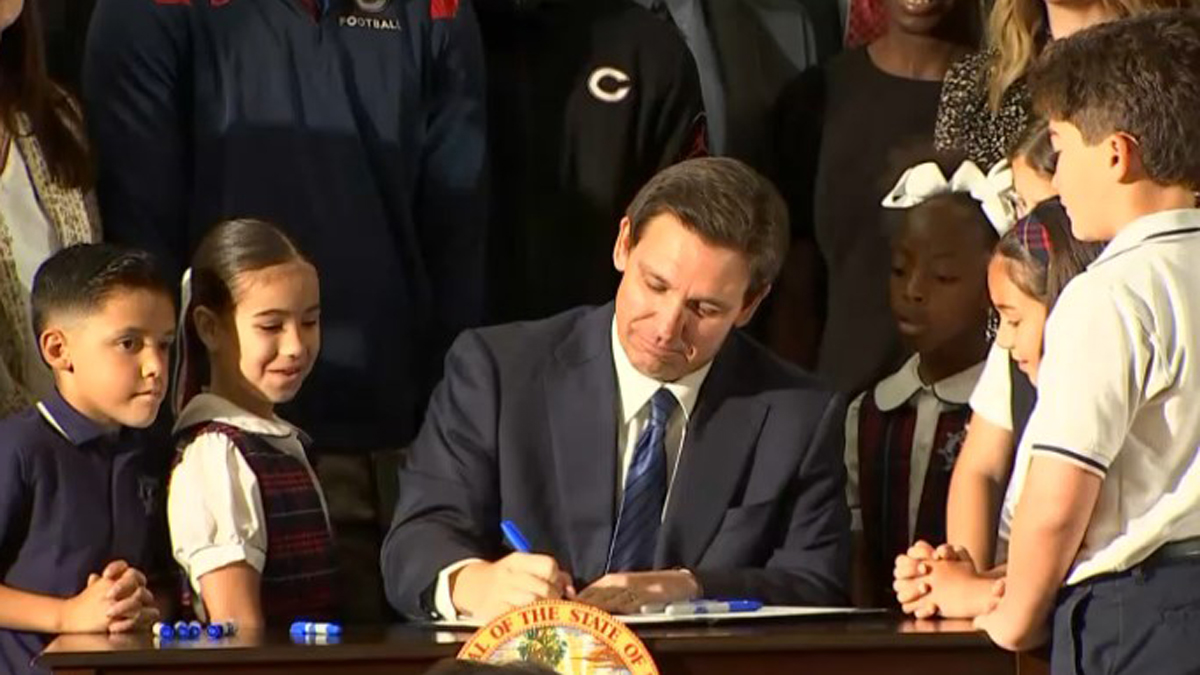Legislation limiting the discussion of sex education in schools and banning certain topics in elementary grades is moving closer to becoming law in Florida.
House Bill 1069, sponsored by Republican Rep. Stan McClain, would restrict public school instruction on human sexuality, sexually transmitted diseases and related topics to grades 6 through 12 only.
Watch NBC6 free wherever you are
>Here's what you should know about the bill and how it could impact your child's sex education.
How would HB 1069 affect K-12 students in the state of Florida?
Get local news you need to know to start your day with NBC 6's News Headlines newsletter.
>One focus of the bill is to define the term "sex" in schools by requiring instructors to teach that a person's sexual identity is determined biologically at birth.
The bill also seeks to prohibit employees and students from providing, being asked to provide, and being required to use certain titles and pronouns.
The bill would also set up more scrutiny of certain educational materials by the state Department of Education and allow parents to object to books and other materials their children are exposed to.
McClain said the bill's intent is to bring uniformity to sex education across all of Florida's 67 school districts and provide more pathways for parents to object to educational materials they find inappropriate for younger children.
The bill comes as another bill, HB 1223, seeks to expand the Parental Rights in Education Law, which some critics call the “Don’t Say Gay” law, from covering kindergarten to third grade to covering pre-K through eighth grade.
HB 1223 would also prohibit teachers and students from describing themselves or others with pronouns besides the ones they were born with within the context of the state’s education system.
How will South Florida students be affected on the local level?
At a Broward County School Board meeting on Mar. 28, a workshop was held to discuss changes to sex education on the local level that align more with state standards than national standards.
The district says it will no longer be teaching alternates to abstinence — only abstinence.
Education about menstruation will also be limited to students in grades 6 to 12 in Broward County.
"Sexual orientation, gender identity is stripped K-3, but the rules passed by the Florida Department of Education make it incredibly difficult to talk about it, even in grades 4-12," said school board member Dr. Allen Zeman. "We know 25% of our students in the nation identify as non-heterosexual, but we cannot talk about anything except for heterosexuals."
FLORIDA
Would HB 1069 ban the discussion of menstrual periods in school?
HB 1069 has been dubbed the "Don't Say Period" bill by critics after concerns about banning the discussion of menstrual periods were raised at a recent committee meeting.
At the meeting, McClain said that menstrual cycles would be included among the topics restricted to grades 6 through 12.
“So if little girls experience their menstrual cycle in 5th grade or 4th grade, will that prohibit conversations from them since they are in the grade lower than sixth grade?” asked state Rep. Ashley Gantt, a Democrat who taught in public schools and noted that girls as young as 10 can begin having periods.
“It would,” McClain responded. However, McClain later said the goal of the bill is not to punish little girls.
At the same meeting, Gantt asked whether teachers could face punishment if they discuss menstruation with younger students.
“My concern is they won't feel safe to have those conversations with these little girls,” she said.
McClain said “that would not be the intent” of the bill and that he would be open to some changes to its language.
How close is HB 1069 to becoming law in Florida?
The GOP-backed bill cleared the House Education Quality Subcommittee on Mar. 15 by a 13-5 vote mainly along party lines.
HB 1069 remains pending in the Florida legislature. If signed by Gov. Ron DeSantis, the law would take effect across Florida on July 1, 2023.



